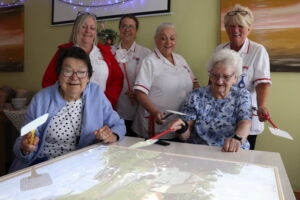Opinion: ‘Social care does not exist to serve the NHS’
David Brindle, Chair of Ambient Support – a registered UK charity supporting older people, delves into a report from the House of Lords, published today, outlining the social sector must now be considered a major priority and not simply a ‘means to an end’ for helping the NHS get back on their feet.
When is the help coming? That’s the question on the lips of everyone in adult social care in England and it’s one that the House of Lords select committee on the sector poses at the head of the concluding chapter of its new and impressive report, ‘A Gloriously Ordinary Life’.
Some help is here. The government’s £500m winter discharge fund should finally be paying out over the next few weeks for extra care packages and pay and conditions enhancements to improve staffing. Additionally, an extra £1bn of government money should be heading social care’s way next April as a result of the Chancellor Jeremy Hunt’s Autumn Statement.
There will be other money, too, though the usual smoke and mirrors mean it will be a lot less than the ‘record’ £7.5bn extra over two years that ministers are trumpeting. Most of that figure is repurposed cash from delayed reforms and extra council tax that local authorities may or may not choose to levy.
This is not the kind of help – substantial, imaginative, transformative help – that the Lords committee has in mind. Social care, it says, is poorly understood and too often neglected by policy makers, the public and the media. ‘We must make things better as a matter of urgency.’
Care minister Helen Whately, in her second stint in the job, is talking urgency too. ‘The challenge for all of us,’ she told care providers at a recent National Care Forum conference, ‘is how many people we can get home from hospital by Christmas.’ This brought a memorable riposte to her face from Vic Rayner, NCF chief executive, who chided: ‘Providers are not just for Christmas’.
The exchange highlighted the gulf between the government’s take on adult social care and that of most other stakeholders and observers, expressed well by the Lords committee. To them, it is something that enables people with care and support needs to live that ‘gloriously ordinary life’ – words used by a lived-experience witness to the committee – with the same choice and control we all expect and command. To ministers, though, it increasingly seems a means to an end: to stop the NHS falling over.
This perception is not being helped by Whately’s new remit, which includes a specific responsibility for hospital discharge. Her speech to the NCF event dwelt heavily on discharge and only in the Q&A session that followed, perhaps sensing a tension, did she remember to say: ‘I truly see social care as an end in itself. Social care does not exist to serve the NHS. It is system in its own right.’
Her corrective did not save her from a withering challenge from Sarah Maguire, chief executive of learning disability provider Choice Support, who said inadequate contract funding left her no option but to pay some staff as little as £9.50 an hour while her student nephew, doing a few hours of casual shelf-stacking at a supermarket, earned £11.60. ‘That’s shameful,’ Maguire said, to applause.
Whately replied that the government was planning workforce reforms to encourage people to build rewarding careers in social care and also reforms of care commissioning that would give providers more confidence about their income and stable levels of work ‘to be able, in turn, to translate that into employment contracts for staff’.
Judging by the polite but lukewarm reception the minister received, these distant prospects cut little ice with her audience. Many of them will likely concur with the verdict of the Lords committee that the government’s ambition ‘falls sadly short of providing a concrete and fully resourced programme of change’.
The 36 conclusions and recommendations of the committee’s comprehensive, 148-page report point to a better way forward. Cynics will see it as just another in a long line of such reports over the past 25 years, all now gathering dust. But the way it is firmly grounded in the experience and voices of people who draw on social care does set it apart and give it particular force.
As for urgency, one eye-catching recommendation calls for appointment within the next 12 months of a commissioner for care and support to act as a champion for older and disabled people and unpaid carers and to ‘accelerate a more accessible adult social care system’. Who knows, if the idea was taken up, the right person just might make that crucial difference.
Photo by Shane Rounce and eberhard grossgasteiger

















